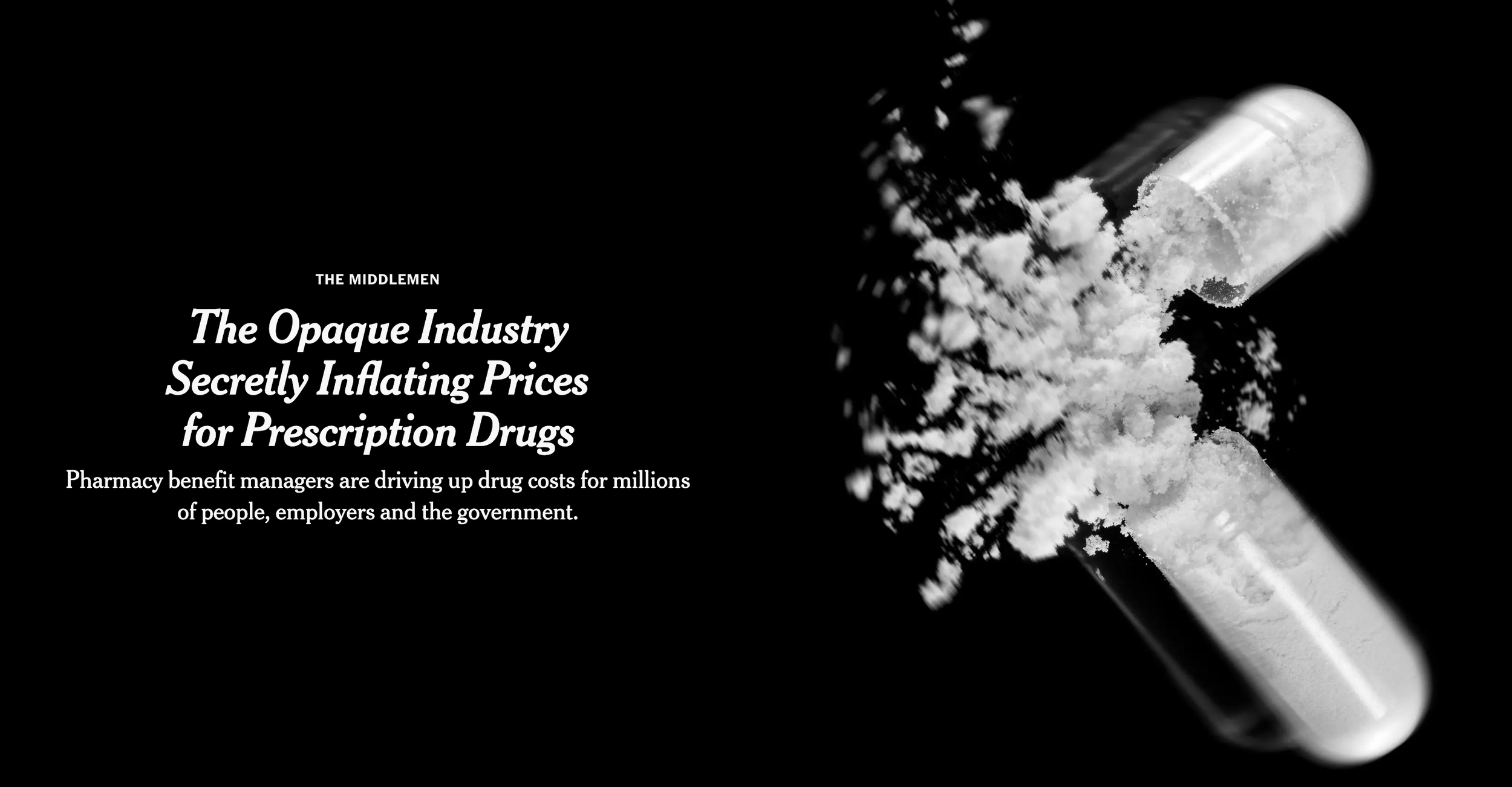
News
from the fight to #SaveIndiePharmacy
New York Times’ The Middlemen series

Texas AG investigating insurance company accused of spying on lawmakers, journalists, other Texans
Superior HealthPlan’s CEO, whom lawmakers grilled about the company’s alleged hiring of private investigators, was reportedly fired after the inquiry was announced.

UnitedHealth’s Optum to address pricing, access challenges for prescription drugs
The changes come as pharmacy benefit managers face scrutiny for how they require doctors and patients to seek its approval for certain treatments and drugs.

Pharmacy Benefit Manager Reform Keeps Getting Scuttled, Despite Bipartisan Support
Despite bipartisan support, a last-ditch effort to pass a healthcare package that included pharmacy benefit manager reforms was scuttled last week. This marks the umpteenth time that lawmakers couldn’t cross the threshold to pass and enact changes to how PBMs do business.

326 Pharmacies Have Closed Since Elon Musk Tanked PBM Reform
The American Economic Liberties Project today released new research showing that at least 326 U.S. pharmacies have closed since Dec. 19, 2024, when Congress abandoned bipartisan, bicameral PBM reforms after Musk claimed there was “too much pork.” Later tweeting, “What is a ‘pharmacy benefit manager.’

Senate Democrats to introduce PBM changes, health provisions dropped from December spending bill
Senate Democrats on Thursday are introducing as standalone legislation a package of health policies, including changes to the pharmacy benefit manager (PBM) industry that was left out of December’s government spending bill.

Congress targets PBMs to curb drug prices, end spread pricing practices
The House is renewing a push to take on pharmacy benefit managers that play an important role in the cost of prescription drugs that has been heavily scrutinized by lawmakers amid industry consolidation and rising prices.

Sen. Grassley Opens Inquiry Into UnitedHealth’s Medicare Billing Practices
The Iowa Republican’s letter to the company cites findings from a series of Wall Street Journal articles.

FTC case against Caremark, Express Scripts, Optum Rx can move forward, judge rules
A Missouri district court judge on Tuesday said stopping the FTC’s suit against the Big Three PBMs would be “against the public’s interest.”

Congress must take on Pharmacy Benefit Manager Reform. It's a bipartisan win | Opinion
The U.S. is increasingly politically polarized, with few issues where voters and elected officials on both sides of the aisle find common ground. But over the past year, one issue has brought everyone together: a distrust of pharmacy benefit managers (PBMs).

Pharmacies are fed up with PBMs. Here’s what reforms might be coming
Pharmacy benefit managers are under increasing scrutiny due to accusations that they are driving their smaller and more vulnerable independent counterparts out of business.

Lawmakers want Indiana to own its own pharmacy benefit manager for state plans like Medicaid
The goal of the bill is to give Indiana a “seat at the table” to play a role in negotiating rebates, pricing, distribution and dispensing fees

Op-Ed: FTC Adds Fuel to the Fire for PBMs. Will Congress Deliver Real Reform?
The FTC's reports and legal actions target PBMs for inflating drug costs and restricting access, focusing on insulin and specialty generics.

Independent pharmacies fight back as PBM reform gains steam
Independent pharmacists across Virginia are rallying behind legislation to reform PBMs, arguing the change is critical for rural healthcare access.

'Knock out the middlemen' is a campaign promise Donald Trump should keep
Congressional leaders in December struck a deal to rein in PBM practices, but the bill fell apart. President Trump has pledged to “knock out the middlemen ” in health care, so the time is ripe for Congress to reconsider the issue.

Congress Can't Wait—Reform Pharmacy Benefit Managers and Deliver Lower-Cost Drugs for Patients | Opinion
As the 119th Congress convenes, policymakers have a historic opportunity to lower prescription drug prices for Americans. As members of Congress begin negotiating the continuing resolution set for March, they can make prescriptions more affordable for Americans and eliminate government waste in the American health care system by prioritizing pharmacy benefit manager (PBM) reform.

Oklahoma takes CVS Caremark to new PBM court over alleged underpayments
Oklahoma's attorney general has accused CVS's Caremark pharmacy benefit manager unit of under-reimbursing pharmacies for prescription drugs

WATCH: Arkansas Pharmacists Association, AG Tim Griffin talk pharmacy benefit manager reform
The Arkansas Pharmacists Association and Attorney General Tim Griffin held a press conference at 10:30 a.m. Thursday regarding statewide pharmacy benefit manager reform legislation.

FTC Releases Second Interim Staff Report on Prescription Drug Middlemen
Report finds PBMs charge significant markups for cancer, HIV, and other critical specialty generic drugs


Lawmakers Plot to Force Health Insurers to Sell Off Pharmacies
Bipartisan bills would make healthcare companies with pharmacy-benefit managers divest their pharmacies





Drugmakers including Purdue Pharma paid pharmacy benefit managers not to restrict painkiller prescriptions, a New York Times investigation found.